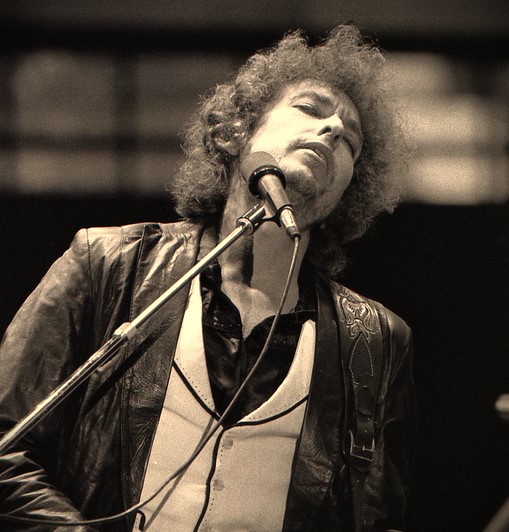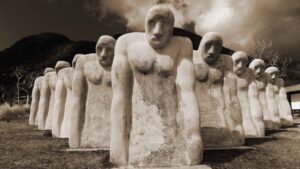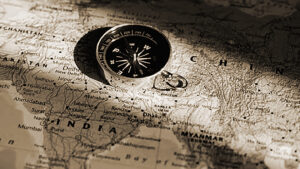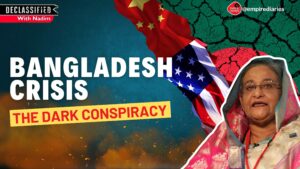
May 24, 2023: On Bob Dylan’s 82nd birthday today, it’s worth turning the clock back to December 3, 1965. In San Francisco that day, the 24-year-old American folk singer was asked by one of the grey-haired journalists at a press conference hours before an evening show: “What is the message you try to convey to the world through your songs?”
Robert Allen Zimmerman, better known as Bob Dylan, replied with a dismissive smile, “I think of myself more as a song-and-dance man.”
He knew too well it wasn’t the case. He brushed the truth aside perhaps because he felt that a mundane press room filled with shallow journalists wasn’t worth a deep discussion on the subject. Only he himself knew too well that Bob Dylan songs – rather, Bob Dylan poems – weren’t run-of-the-mill stuff.
It was a war. A war on Power. A war on Empire.
Dylan’s dismissive answer to the most pertinent question one could ask him at that time defined his character and philosophy – disdain for the corporate press; disrespect for the social order; suspicion of the elite; and extreme anger towards Empire.
Bob Dylan vs. Empire
To understand this from a geopolitical standpoint is to go beyond Bob Dylan’s genre, singing style, his mannerisms, his twang, and his endless discography. An understanding of Dylan is complete only when one grasps the agenda in his simmering lyrics. An agenda that was never hidden. An agenda to repeatedly drag Empire to the dock. And give it an eye for an eye.
With his puny frame, Bob Dylan belted out lyrics that were sharp, scathing and would strike straight at the heart of Empire like a dagger. The artistic onslaught was invisible to the naked eye. Yet, it was enormous in terms of sociopolitical dimensions.
Each of his protest songs could be visualised as a David-and-Goliath, poor-and-rich, dissident-and-hegemony contest. Every line, almost every word, was a showdown with the power elite.
Take one of his masterpieces from the 1960s, Masters Of War, for instance. He wrote the song during the American winter of 1962-63. It was released with the album The Freewheelin’ Bob Dylan in 1963.
And I hope that you die
And your death’ll come soon
I will follow your casket
By the pale afternoon
And I’ll watch while you’re lowered
Down to your deathbed
And I’ll stand o’er your grave
‘Till I’m sure that you’re dead.
The song is full of anger, hatred and venom directed towards the powerful classes who were waging the Cold War during those days.
Although Dylan doesn’t name the war or its culprits in his lyrics, the song is a brutally straightforward rant directed at Empire as a warmonger. Very few protest songs that have made it big are as at-the-face as Masters Of War is.
Take another protest song as an example. Another classic – A Hard Rain’s A-Gonna Fall. This song was also part of the 1963 album, The Freewheelin’ Bob Dylan. The song is not as straightforward as Masters Of War is, but it’s about another pressing issue of the 1960s: the spectre of a nuclear war resulting from the Cold War and threatening to obliterate humankind.
Some observers say it’s a protest song specifically targeting the fortnight-long 1962 Cuban Missile Crisis, when John F Kennedy’s chest-thumping US and the Soviet-instigated Fidel Castro had come to the brink of a full-fledged nuclear war.
I saw a newborn baby with wild wolves all around it
I saw a highway of diamonds with nobody on it
I saw a black branch with blood that kept drippin’
I saw a room full of men with their hammers a-bleedin’
I saw a white ladder all covered with water
I saw ten thousand talkers whose tongues were all broken
I saw guns and sharp swords in the hands of young children
And it’s a hard, and it’s a hard, it’s a hard, it’s a hard
It’s a hard rain’s a-gonna fall.
The cryptic passage narrates apocalyptic scenes from the imagined aftermath of a nuclear holocaust. The song is a protest against the mindless nuclear arms race of the ’60s. Clearly, that artwork from Dylan was a scornful swipe at Empire.
The Times They are a-Changing
No less disturbing from Empire’s point of view would have been his yet another famous song – The Times They are a-Changin’. The timeless classic was released in 1964 as part of an album that went by the same name.
The lyrics from Bob Dylan’s best songs are a stinging attack on political manipulators, business hawks, dictators, autocrats, and spin doctors possessive about power and detached from the revolting masses who’re seeking to bring about a change. In the song, Dylan doesn’t spare anybody who has a hint of power to exercise, from American congressmen in governance to domineering parents at home.
Come senators, congressmen
Please heed the call
Don’t stand in the doorway
Don’t block up the hall
For he that gets hurt
Will be he who has stalled
The battle outside ragin’
Will soon shake your windows
And rattle your walls
For the times they are a-changin’.
Through this powerful number, Dylan sends a chilling message to the power elite. He warns them that the winds of change are blowing, and it’s time for Empire and Emperors to count their days.
Blowin’ in the Wind
Talking about the winds of change, what can be more poetic and compelling than his yet another anti-imperialist classic – Blowin’ in the Wind?
Dylan wrote this song in 1962. He first released it as a single and later packaged it with the album The Freewheelin’ Bob Dylan that was rolled out the next year. The song asks uncomfortable yet relevant questions about war, peace, freedom and justice.
Yes, and how many times must a man look up
Before he can see the sky?
And how many ears must one man have
Before he can hear people cry?
Yes, and how many deaths will it take ’til he knows
That too many people have died?
The answer, my friend, is blowin’ in the wind
The answer is blowin’ in the wind.
Dylan wonders aloud in this song how long the perpetually oppressed would have to wait for Empire’s misdeeds and injustices to come to an end.
Add to these songs many others in which Dylan addresses the issue of human rights and their violation. In fact, his discography is dripping with songs highlighting racial injustices suffered by African-Americans at the hands of the Anglo-American White man – songs such as Oxford Town, Hurricane and The Lonesome Death of Hattie Carroll.
Eighty-two years back, Dylan was born Robert Allen Zimmerman to Jewish parents in Duluth, Minnesota. Many decades down the line and long after becoming a global icon, he embraced Christianity. Yet, over the last 62 years spanning his musical journey, Dylan spun himself into one of the most outspoken heretics of his time, shattering faith-based conventional wisdom, and raising awareness about civil rights and the need for global peace.
Bob Dylan’s Nobel Prize
One can bet that not a single Dylan fan was surprised when our man deliberately made the Nobel Academy wait for a good fortnight before confirming that he had accepted the prize for literature. He didn’t even personally go to Sweden to receive the prize.
Well, the Nobel peace prize was set up long back by one Mr. Alfred Nobel, who had invented the dynamite – of all things on the planet. And here, we’re talking about a man who penned and sang the inspiring masterpiece Masters of War.
There are many Bob Dylans that Bob Dylan has tossed at us to juggle with. One of them has shown the world that it’s possible to stand up to Empire through powerful art, and yet last the mile.
(Homepage photo: Bob Dylan and Joan Baez, WikiCommons)
REPUBLISHING TERMS:
All rights to this content are reserved. If you want to republish this content in any form, in part or in full, please contact us at writetoempirediaries@gmail.com.









Very well analysed and very well written.
True, the change thought decades and decades has happened and is picking up in rapido.
Thank you for your response and opinion. Cheers.